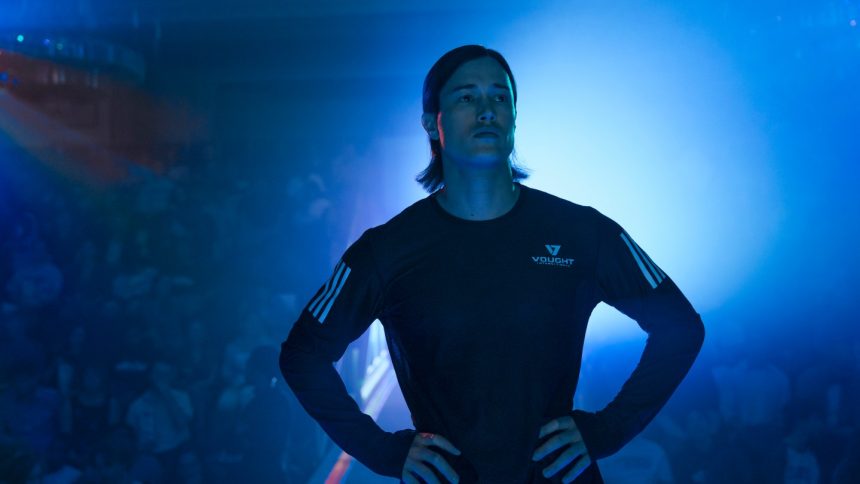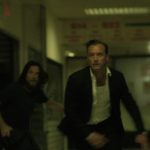‘Gen V’ Star Derek Luh on That Cage Match, Jordan’s Masculinity and Biggest Fear in Season 2
[This story contains spoilers from the fourth episode ofGen V season two, “Bags.”]
In the latest episode of Gen V, a showdown between a bloodbender and a genderbender pits the Odessa Project — Marie (Jaz Sinclair) — and her seemingly indestructible themfriend Jordan (Derek Luh and London Thor) against each other in a battle royale orchestrated by the frightening new school dean, Cipher (Hamish Linklater).
Punishment for Jordan refusing to, at a school anniversary rally, perpetuate lies about their identity and on behalf of the school that killed their friend Andre (Chance Perdomo), the cage match ends with Jordan being floated like a human blood bag by Marie. That’s after Cipher takes control of Jordan’s body and powers, unleashing their fists on Marie when the two choose to give the crowd a kiss rather than a fight.
After surviving Elmira; working through Marie’s abandonment and sharing an enchantingly normal first time with her; nearly killing Cate (Maddie Phillips) and then having to team with her; stopping Sam (Asa Germann) from destroying himself and school property; and having their identity manipulated in the name of an evil administrator seemingly obsessed with their girlfriend, Jordan’s cage fight becomes an ultimate act of courage and sacrifice. And one that leaves viewers hanging on a deadly cliffhanger.
You Might Also Like
Speaking with The Hollywood Reporter ahead of Wednesday’s episode, Luh — one-half of Jordan’s acting duo — unpacks what’s really underneath some of their reactions and moves across the season’s first four episodes, from being left behind by Marie in Elmira and the fate of their late friend Andre, to cage match confessions and ruining their shot at the number one ranking.
***
When Jordan and Emma (Lizze Broadway) get out of that truck at Godolkin, and they’re being forced to agree to a lie about what has happened to them, it’s not Jordan who makes the call to stay and survive. They hesitate, and Emma makes the call, which feels a little different from the confident, assertive Jordan of season one. What’s behind that feeling that we’ve sort of continued to see? What has shifted in them?
When you get to such a low, such a depression, and you’ve lost everything — you’ve lost a friend, you’ve been locked up for however long — and you’re allowed to sit with the fact that everything you thought was right is completely a hoax and wrong, you get to this point where you’re like “Fuck it all. I don’t care. Send me back.” I’d feel better in Elmira than having to deal with this facade of a reality. That was where Jordan was: “I don’t want to deal with any of this. Look what happened when we fought back. It got us into Elmira. I went along with your guys’ plan, but I was better in the place when I just lied to myself.”
Jordan is such a lover, but they have this shield up in defense to protect that soft, loving, loyal heart. So when they finally let [the shield] down, and they’re like, “I’ll go along with the gang,” look where it gets them. They’re in that spot again, and then finding out that Marie left them — your person leaves you, the person that you finally, truly allow yourself to be yourself with, and they finally see you — it’s another stab in the heart. So in the beginning, Jordan is at that place where they’re just like, “Fuck it all. I don’t care. I’m not doing anything you say. Put me back in Elmira. Torture me. Do whatever you need to do. There’s no worse pain than what I feel right now.”
Emma and Jordan have very pointed reactions after being released from Elmira, and Jordan focuses a lot of their ire at Marie. Multiple things are happening with that initial response, but it gets a new layer when Jordan finds out Andre knew his power could kill him. Jordan calls Andre’s actions suicide while also revealing they thought about stopping him, but didn’t. That feels like a call back to Luke and Brink. How much of Jordan’s response is them mad that Marie left them, how much is it misssing Andre, and how much of it is not living up to the person they want to be?
It’s split down the middle. When you’re emotionally immature, trying to figure it out — and we think we know everything at 18, 19, 21 — you want to blame somebody for your pain and hurt. You want to blame somebody for your bad actions. Because it’s easier to put that blame on somebody else, instead of looking at yourself in the mirror and being like, “I’m not living up to the person that I’m supposed to be. I could have been the hero and stopped Andre. I could have been a better friend and stopped Andre, but I let him do this anyway, because selfishly, I wanted to get out of there.” [Marie’s] the most reachable person. You don’t want to blame Andre, and you don’t want to blame Luke. You lost two of your best friends. So who do you blame? You blame the most direct person that’s right in front of you. It’s tough to really sit with all of those feelings and not want to blame somebody and have to look at yourself.
In terms of being done with it all, Jordan pulls a Marie and Tek Knight moment from season one during this Godolkin Day rally speech. That also feels somewhat against type as being number one at any cost, which was so important to Jordan. What ignites or instigates that response, outside of being done with the machine?
The seed is planted when Jordan and Sam have that conversation about what would you say to [Luke and Andre]? “I love you” feels too cliché, but you never know what’s gonna happen. Because then the next scene [with Marie] is like, “I love you, and I don’t know what’s going to happen, but —” is there’s time to think about those things. From when that scene happened to when the “I love you” scene happened, there are hours, or however long they ruminate on that. Jordan really was thinking about what’s the best way I can avenge my friend? That, for the first time, was Jordan truly being selfless, and they needed to because they lied or pretended like they didn’t know about Luke, so that they could remain a TA. It was the first time Jordan is like, “I’m done playing the games. Whatever happens to me, at least I have a clean conscience and can be proud of the person that I am.” That was a really big moment for Jordan to admit that.
In the build-up to this scene, Jordan has a clash with the head of student life about their gender identity, and the school’s intentional disregard of their experience and language around it. Around season one, there was talk and some essays about how Jordan spoke to the trans experience, but they are clear here that this is not how they identify. Did you talk to Michele or any of the writers about that moment and how you all wanted to distinguish not diminish the trans experience from the bigender experience, even if trans and nonbinary people can face similar societal issues?
We have a trans consultant in [executive story editor] Jett [Garrison] who’s been amazing on the writing and production team. But it was important to make sure we showed Jordan was bigender because we didn’t want [their experience] to be any singular experience. We wanted it to be a little bit on a spectrum. Trans and nonbinary people can feel seen, and also because it is a super power — and this is set in the world of The Boys and made up — we didn’t want it to technically be that. We wanted to be sensitive because, honestly, if they’re trans, let’s just get a trans actor to play this. That’s why the team made them bigender. But being bigender is very important to them. They want their own identity [acknowledged] as well. I’m not trans. I’m bigender and in that world, I’m sure there’s another little nonbinary or bigender supe out there looking at Jordan as their hero.
Ahead of the cage fight, we see a bigender character who, like Sam, is facing this challenge about “strength.” Not just because of their powers, but because they’re also understood or misunderstood as people by others based on how their identities are treated societally. This pre-fight conversation is one of Jordan’s most vulnerable moments on-screen, and for a character who can choose how they present, they’re choosing to present as a man. Can you talk about what that moment says about Jordan, how they see their gender and how they might challenge gender stereotypes?
It’s obvious to me, because I’ve worked on the character so much, but Jordan is clearly more comfortable female presenting whenever there’s conflict. When they were speaking to their father about [their gender] and are like, “Because we had fun dressing up, daddy,” — they feel more empowered in their female form. In that vulnerable moment in the locker room right before they go out there, it’s important for Jordan to show that other side to Marie because of what they’ve just done in the scene before, when they’re like, “I’m done pretending about who I am.” I
t’s also just a great take on masculinity. You’re not supposed to think about those things. You’re supposed to get out there and fight. You’re not supposed to worry about what other people think about you. You’re a warrior. Go out there and do what you need to do. I think it’s so beautiful that the writers chose to have Jordan in the male form for that vulnerable scene. I also think it’s so sweet that Marie is so comforting of that and doesn’t bat an eyelash. She’s just there to reassure. I’m very fortunate I was able to do that, and I’m glad they trusted me with that scene. But I think it’s very, very powerful for Jordan to have delivered that vulnerability in their male form.
Over these past four episodes, Jordan has openly admitted to fear — of loving and losing Marie, over things tied to Elmira, Cipher and Cate, of the match’s crowd and society’s treatment. And yet, even as this room is calling them a deceiver, and villainizing them for being one of the only fully honest people about themselves and Godolkin, they still go out on that stage. How does Jordan facing that room of people shouting them down represent how they’re strength has grown beyond their powers?
They could easily just run. They could not show up and then go on the run like Marie did. But going out there and, like you said, staring down those 700 people and the whole public that now hates you when this is your worst nightmare and you always knew that people were gonna hate you? God, what’s that saying about fear?
Courage is not the absence of fear, but a recognition that there’s something more important than that fear.
Exactly. That’s what Jordan feels in that moment. Because this is bigger than them. This is to save Marie, essentially, if they do this. If they do this, Marie will be number one. They’ll be hated, and everything can go back to the way it was. Everything can fall back into Vought’s perfect scheme and nobody gets hurt, nobody gets killed, nobody gets sent back to Elmira. So it’s I’ll deal with this. I’ll shoulder this load for for everybody.
That, to me, is the ultimate courage and the ultimate act of selflessness, which is this beautiful, huge arc that Jordan is continuing to go on. It’s so beautiful to watch. Even when we have that moment in the locker room, and then you see them switch after they walk out — when I re-watch the episode, I can see in my body how I’m doing it. This is a fake confident person, but they’re still out there. They’re still walking into that cage. They’re still doing what they need to do. They cut a scene between me and Jaz. We have a beautiful dialogue. I get it. It makes sense for the pacing, but it sets that courage a little bit more up. Then, also, Marie being a champion for Jordan. It was such a beautiful moment. But Jordan staring that down and going out there and doing that for the bigger cause of the group — Emma, Cate, everybody — they’re very courageous.
Marie leaving them at Elmira clearly upset Jordan for a few reasons. They express not wanting to lose her, and it’s clear they want to protect her every single time Jordan throws their body in front of her in a situation. But during that match fight, Marie and Cipher took hold of their body and powers, something Jordan has clearly had a high level of control over. Could that make Jordan also afraid of Marie? Or is the former, losing Marie, their big fear right now?
I am smirking because when you said the former, I’m like, that’s probably what it is. It’s 100 percent if she becomes the most powerful — and not in a metaphorical sense — I’m gonna lose the person I love to Vought, and they’re gonna trot her around like a show pony. But then when they get what they want from her — and we know this — they’re gonna kill her. So if I go along with this, I am going to lose the only person that has ever seen me, for all of me, and the only person that I’ve loved and that loves me back. That’s the fear, and it’s definitely there. They’re afraid to lose Marie, for sure.
***
Gen V season two releases new episodes on Wednesdays, with the first four episodes of season two now streaming on Prime Video.







